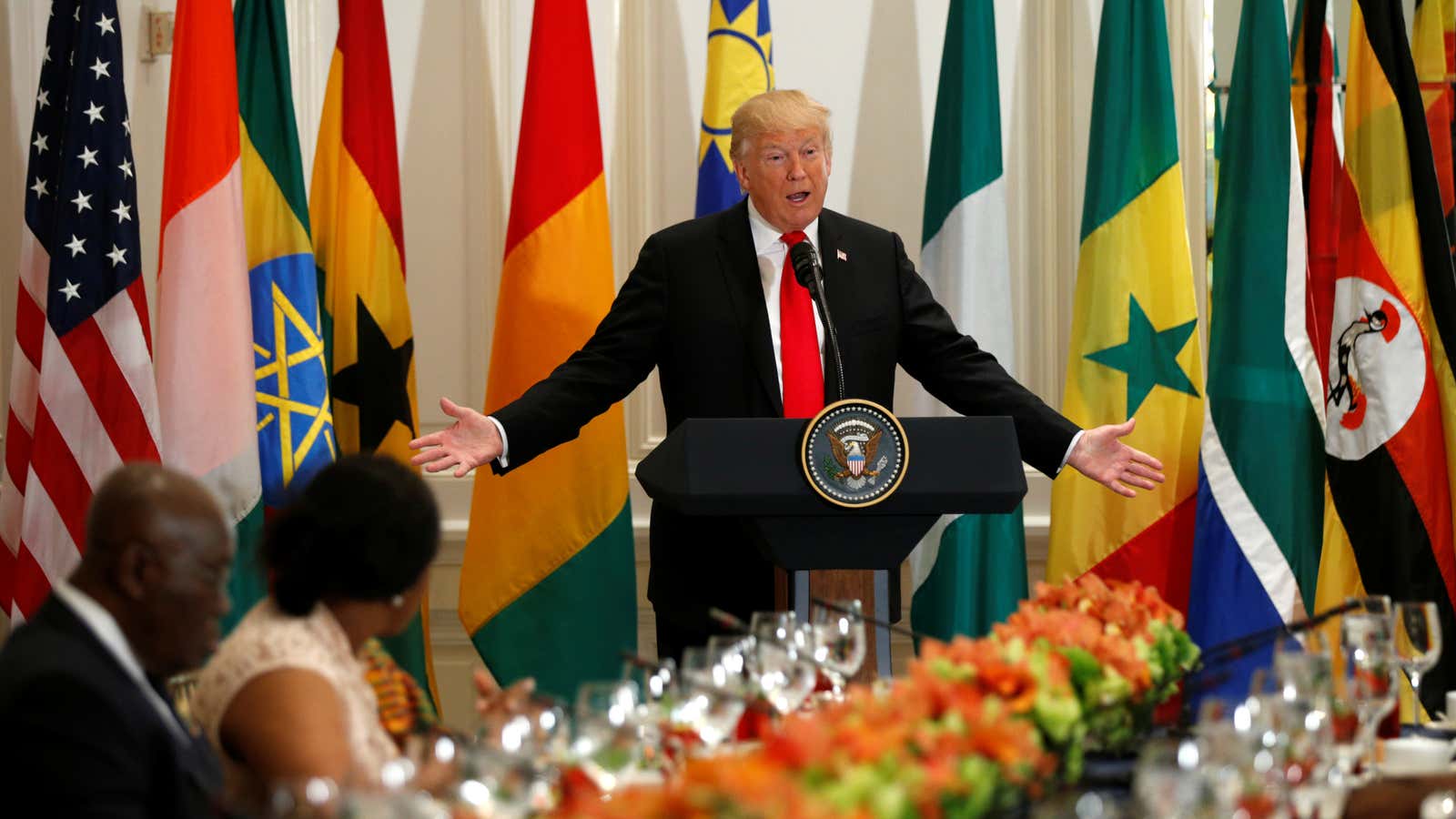Eight months into his term, president Donald Trump made his first Africa policy speech on the sidelines of the UN General Assembly meeting in New York. Over lunch at a posh hotel built by Leona Helmsley’s husband and once owned by the Sultan of Brunei, Trump signaled that his Africa policy would revolve around doing business and fighting terrorists on the continent. Meanwhile, Trump failed to mention the democracy, development, human rights, or corruption challenges facing the continent.
Channeling the ghost of King Leopold–the Belgian king who saw Africa as ripe for exploitation–Trump ad-libbed that “Africa has tremendous business potential, I have so many friends going to your countries trying to get rich. I congratulate you, they’re spending a lot of money.” Across news and social media platforms, these tone-deaf sentences—along with Trump’s “Nambia” gaffe—eclipsed his other more benign comments.
Trump’s overdue foray into Africa policy belies the degree to which his administration as neglected—and at times even undermined—US engagement with the continent.
Trump’s 2018 budget proposal, for example, included several significant discretionary cuts to Africa-related programs. It eliminated funding for the African Development Foundation, US Institute for Peace, and U.S. Trade and Development Agency: three entities that focus extensively on Africa.
And although Trump said yesterday that U.S. Ambassador to the United Nations Nikki Haley and Secretary for Health and Human Services Tom Price would travel to Africa “to promote our global health security agenda”, his budget proposal included a 17% cut to the president’s Emergency Program for AIDS Relief (PEPFAR)—an initiative long-championed by Republicans.
Trump’s executive actions have also proven disruptive. For example, just weeks before Trump’s friendly shout-out to Guinean President Alpha Conde yesterday, the Department of Homeland Security suspended issuance of some types of visas to Guinea, Sierra Leone, and Eritrea for their government’s alleged refusal to accept U.S. deportees. A heavy-handed move championed by nativist Trump adviser Stephen Miller, the decision no doubt resulted in diplomatic fallout.
Miller’s unwanted attention aside, Trump’s foreign policy team—secretary of State Rex Tillerson, secretary of Defense James Mattis, and National Security advisor H.R. McMaster—have shown minimal interest in Africa.
The Department of State—usually the engine of U.S. Africa policy—has seen a rapid decline in its standing, capabilities, and morale under Tillerson’s leadership. He has yet to nominate someone to lead the Department’s Africa Bureau, responsible for formulating U.S. Africa policy and running 45 embassies across the continent.
Tillerson’s long-rumored plan to nominate well-known Africa wonk Dr. J. Peter Pham was recently blocked by Oklahoma Republican Senator James Inhofe, who objected to Pham’s (mainstream) views on Western Sahara. With Pham’s nomination nixed, it will be several more months before Tillerson is able to identify and vet another nominee.
Despite this yawning leadership vacuum, Tillerson ordered the Africa Bureau to slash its delegation from 30 top diplomats down to just three, leaving U.S. policymakers ill-equipped to engage with their African counterparts in conjunction with Trump’s speech.
As one-note and antediluvian as Trump’s Africa policy vision is, even it will need a well-functioning State Department and high-level policy momentum to gain traction. Without these enablers in place, luncheons like the one yesterday may be the signature Africa policy achievement of a president who sees the continent as place where cigar-chomping American business executives can get rich quick—rather than as a constellation of idiosyncratic nations with complex challenges and unmet aspirations of their own.
